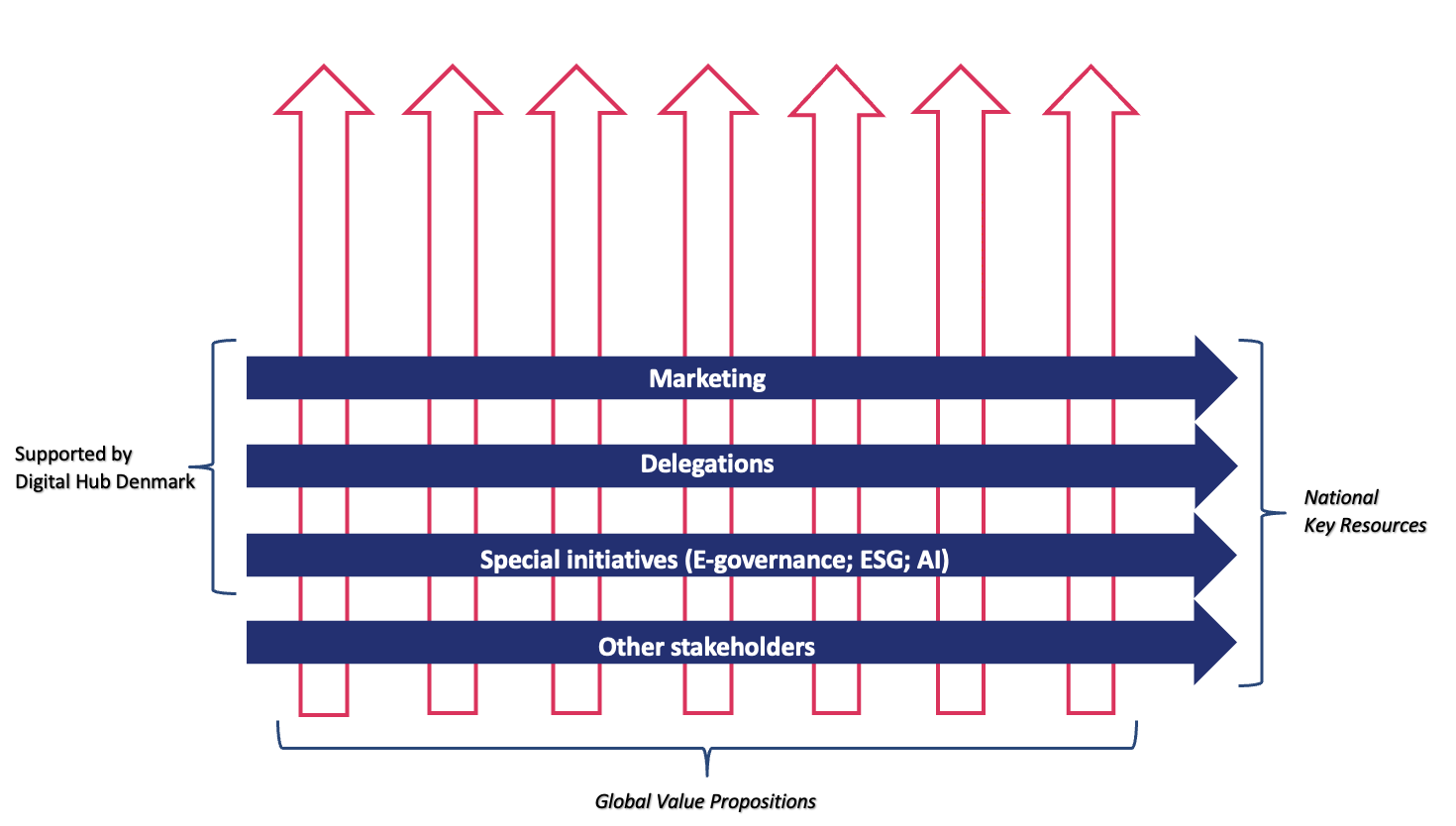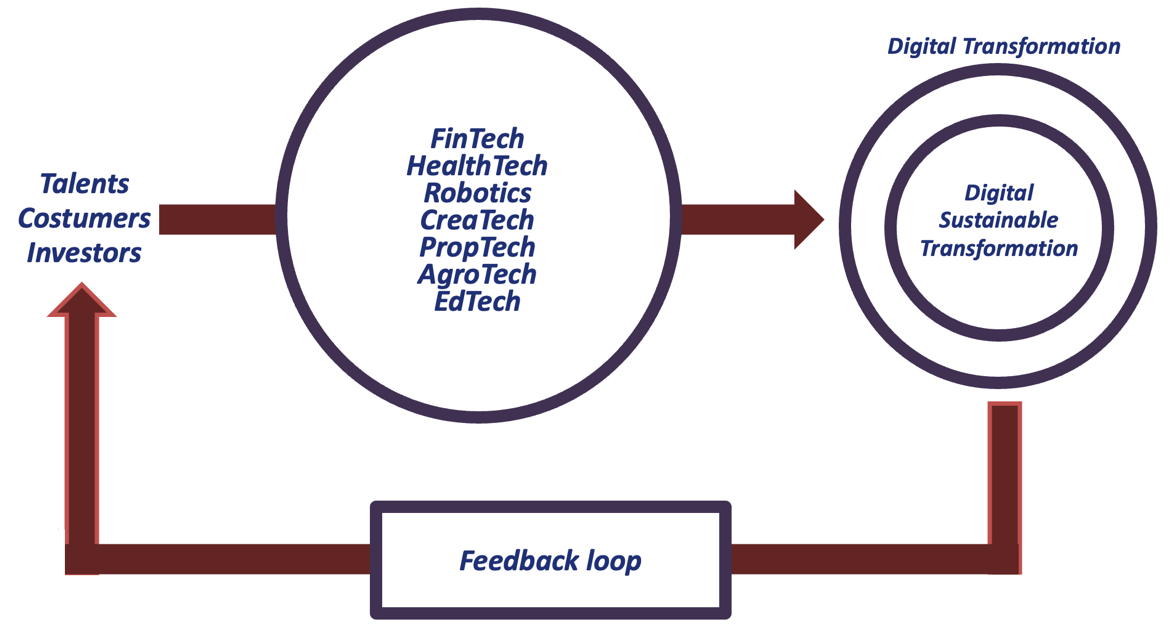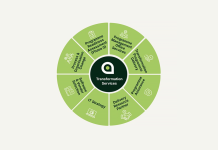Digital Hub Denmark has developed and implemented a unique governance model for digital tech ecosystems that can be leveraged to accelerate sustainable digital impact
For Denmark to remain positioned as a digital frontrunner and attractor of international talent and investors, Digital Hub Denmark has developed a unique governance model to support the ecosystems of digital tech start- and scale-ups.
The model is termed the Danish Digital Ecosphere, and it is constituted by the Danish leading digital tech ecosystems: FinTech, HealthTech, Robotics, CreaTech PropTech, AgriTech, and EdTech. These ecosystems are all non-for-profit cooperatives, with a top-manager, a secretary, and a professional board. The Danish Digital Ecosphere is governed by a steering committee with the ecosystems’ top managers and leaders from Digital Hub Denmark. The steering committee handles shared agendas regarding e.g., marketing and delegations which is illustrated in an Ecosphere canvas.
Denmark’s digital tech startup scene is doing well. Investment figures from 2020 to 2021 show an investment growth of approx. 300 % to approx. 2,1 billion Euro. In addition, the number of startups is growing steadily – from an estimated 800 in the summer of 2019 to 1,145 today – approx. 45 % in less than two years.
The common agenda in Denmark’s Digital Ecosphere
It is completely unique that Denmark has governance across the market verticals that the digital tech ecosystems represent. The thing is, for example, a FinTech company has more in common with a PropTech company in terms of business development than it has with other companies in its domain (banks, etc.). Thus, there is a common agenda in Denmark’s Digital Ecosphere regarding talents, customers, and investors that the digital tech companies need for their potential exponential growth and their solutions with a digital transformative value proposition.
All the digital tech companies in the ecosphere are designed for fast growth. To this end, they are not older than ten years or they have revived growth funds within the last five years. Moreover, they all leverage digital disruptive technologies in their solutions sharing a value proposition of digital transformation. Because they all are entrants, they need to introduce radical innovation to compete with incumbent players. Therefore, the Danish Digital Ecosphere might represent the most important radical innovative potential in the digital field.

Digital transformation with a sustainable impact
So, how to govern the direction of this radical innovation of the Danish Digital Ecosphere towards a digital transformative value proposition with a sustainable impact?
The ecosystems in the Danish Digital Ecosphere estimate that more than 100 digital companies in the eco-sphere have a value proposition that can be used to reduce CO2 footprint as a key element in their business model. They also estimate that more than half of the digital tech companies have a value proposition that contributes to at least one of the 17 sustainable development goals (SDG).
To this end, over half of the ecosystem’s companies has a value proposition with a sustainable digital impact. Meaning, if a customer buys such a solution, it can be used to e.g., improve health, reduce CO2, or poverty, if the solution is used correctly. For now, this assessment is quite subjective from ecosystem to ecosystem, and to make the digital tech companies able to account for their sustainable digital impact in a comparable way, there is a need for further R&D in specifying a standard. However, Denmark does have a starting point, and the Danish Digital Ecosphere’s steering committee has agreed that is important to mature the standard and techniques for digital sustainable impact.

Measuring the sustainable digital impact in its unique governance model
Denmark has with its unique governance model for digital tech ecosystems a point of departure for accelerating solutions for sustainable digital impact. The recipe is to measure the sustainable digital impact from Denmark’s Digital Ecosphere and apply this in a feedback loop, as known from regenerative design, to attract and maintain talents, customers, and investors sharing a suitable development agenda. To this end, the goal is a regenerative digital ecosphere.
A regenerative ecosphere governed with an SDG direction would implicate that Digital Hub Denmark should target talent attraction (and maintain) towards purpose-driven talent, investors with a focus on sustainable investments, and customers who want to contribute to a better world.

Digital Hub Denmark Explainer
Digitalisation is important to governments. Denmark is no exception, and in 2018 the private-public partnership Digital Hub Denmark was launched to be a digital frontrunner in Europe by 2023. The private partners are The Danish Chamber of Commerce, Confederation of Danish Industry, and Finance Denmark, and the public partners are the Ministry of Industry, Business and Financial Affairs, Ministry of Higher Education and Science, and Ministry of Foreign Affairs of Denmark.
The public and private partners approximately fund the partnership with 90 % and 10 %, respectively; however, all partners have an equal vote in the board of directors with an independent chair. Digital Hub Denmark is founded with two obligations regarding a national platform and marketing activities. The national platform (Denmark’s Digital Ecosphere) regards matchmaking and learning, and marketing regards marketing of Denmark and increased attraction of talents, customers, and investors. These obligations are interdependent, as the national platform can be utilised for marketing activities and the marketing activities can be utilised for the growth of the national platform.
Sources
Rosenstand, C. A. F. (2021). A canvas for a digital ecosphere. Research Outreach, 126, 138-141. https://researchoutreach.org/publications/issue-126/
Rosenstand, C. A. F. (2021). Governance framework for performance measurement of a regional digital ecosphere. Event Proceedings: ISPIM Innovation Conference – Innovating Our Common Future LUT Scientific and Expertise Publications.
Rosenstand, C. A. F. (2021). Selecting, Combining, and Cultivat- ing Digital Ecosystems in a Digital Ecosphere. I D. Schallmo, & J. Tidd (red.), Digitalization: Approaches, Case Studies, and Tools for Strategy, Transformation and Implementation (s. 305-312). Springer Nature. Management for Professionals https://doi.org/10.1007/978-3-030-69380-0_17
Please note: This is a commercial profile
© 2019. This work is licensed under CC-BY-NC-ND.











